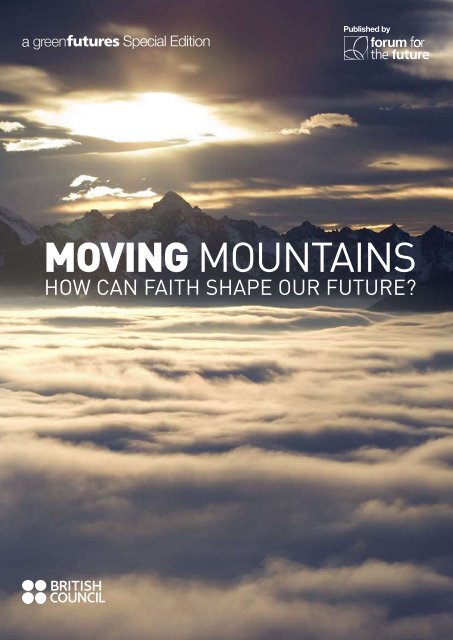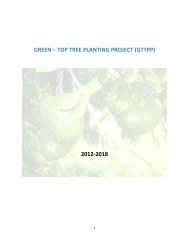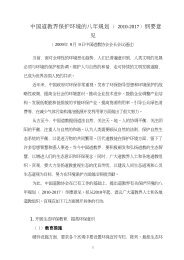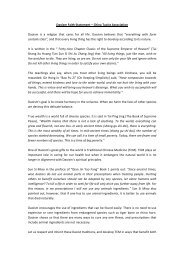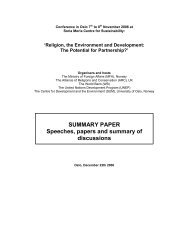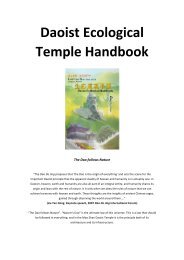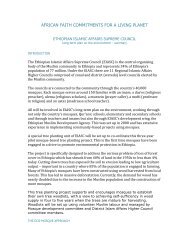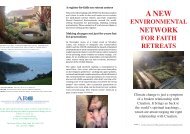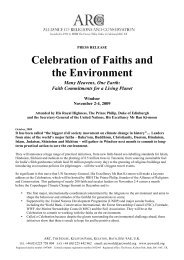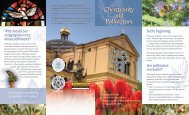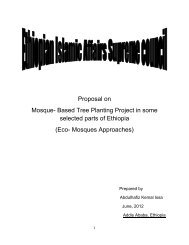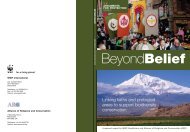here - Alliance of Religions and Conservation
here - Alliance of Religions and Conservation
here - Alliance of Religions and Conservation
Create successful ePaper yourself
Turn your PDF publications into a flip-book with our unique Google optimized e-Paper software.
a<br />
greenfutures<br />
Special Edition<br />
Published by
“ Spirituality is the exact<br />
opposite <strong>of</strong> dropping out”<br />
Sustainable development<br />
isn’t just about triple bottom<br />
lines, or enlightened selfinterest;<br />
primarily, it’s a<br />
heart <strong>and</strong> soul story.<br />
I wonder how many people<br />
are comfortable with that<br />
assertion. I’ve been struck over<br />
the years by the number <strong>of</strong><br />
people in my ‘green’ world who<br />
have remained sceptical about,<br />
or even hostile to, the so-called<br />
spiritual dimension <strong>of</strong> the<br />
green movement.<br />
As with so many aspects <strong>of</strong><br />
sustainable development, this<br />
is both personal <strong>and</strong> political.<br />
Personal because people have<br />
strong views about faith <strong>and</strong><br />
religion. They say: “This is what<br />
I believe”. And beliefs are not just theoretical: they<br />
matter enormously to people in practical terms. And<br />
it’s political, in that the world’s major religions play a<br />
hugely influential role in the lives <strong>of</strong> billions <strong>of</strong> people<br />
– <strong>and</strong> as such, are critical intermediaries in helping to<br />
inform <strong>and</strong> inspire people about living<br />
more sustainably.<br />
As G<strong>and</strong>hi said, “I claim that human mind<br />
or human society is not divided into watertight<br />
compartments called social, political, religious. All<br />
act <strong>and</strong> react upon one another. I do not believe that<br />
the spiritual law works on a field <strong>of</strong> its own. On the<br />
contrary, it expresses itself only through the ordinary<br />
activities <strong>of</strong> life.”<br />
It is these ‘ordinary activities’ that we need so<br />
urgently to address, <strong>and</strong> so this special edition looks<br />
Two sides <strong>of</strong> the same coin<br />
at the role <strong>of</strong> spirituality in doing<br />
so. The challenge <strong>of</strong> dealing with<br />
materialism <strong>and</strong> the excessive<br />
lifestyles <strong>of</strong> the rich can only<br />
become more pressing in the<br />
future. A lot <strong>of</strong> the terminology<br />
associated with sustainable<br />
living – wellbeing, quality <strong>of</strong> life,<br />
simplicity, downsizing – implies a<br />
lesser emphasis on money <strong>and</strong><br />
possessions, <strong>and</strong> a greater focus<br />
on our ‘inner’ lives, on family <strong>and</strong><br />
friends, the arts, <strong>and</strong> on activities<br />
with a smaller environmental<br />
impact. T<strong>here</strong> is, <strong>of</strong> course, a lot<br />
<strong>of</strong> secular advice <strong>and</strong> teaching<br />
on living more simply. But for<br />
many, the spiritual dimension<br />
provides that extra impulse.<br />
T<strong>here</strong> remains the<br />
widespread suspicion that the spiritual means to<br />
‘drop out’: to disappear narcissistically inwards,<br />
devoting one’s life to meditation <strong>and</strong> even navelgazing.<br />
T<strong>here</strong> is a time for contemplation, but it<br />
seems clear that an exclusive emphasis on the<br />
unworldly, on withdrawal from this grubby industrial<br />
culture <strong>of</strong> ours, merely reinforces the parody <strong>of</strong><br />
spirituality as a morally superior way <strong>of</strong> dropping out.<br />
For many people today, a more spiritual<br />
orientation dem<strong>and</strong>s the exact opposite <strong>of</strong> dropping<br />
out. When it comes to the defence <strong>of</strong> the Earth <strong>and</strong><br />
its people, it means militantly putting into practice<br />
what we pr<strong>of</strong>ess to believe.<br />
Jonathon Porritt is Founder Director <strong>of</strong> Forum<br />
for the Future.<br />
Making common cause<br />
In the last 25 years, the faiths have become the<br />
fastest growing environmental movements in<br />
the world, shaping the lives <strong>of</strong> billions – from<br />
the Daoists <strong>of</strong> China to the Evangelicals <strong>of</strong> the US.<br />
Yet for many environmentalists, this has all happened<br />
without them noticing.<br />
Now, following the failure <strong>of</strong> Copenhagen <strong>and</strong> the<br />
rediscovery by green activists <strong>of</strong> civil society, secular<br />
groups are waking up to the potential <strong>of</strong> working with the<br />
faiths – even viewing them as crucial partners. So what<br />
can the faiths bring to the environmentalists’ table?<br />
First <strong>of</strong> all, the fact that they are not conservation<br />
bodies. Rather, the faiths include the oldest <strong>and</strong> most<br />
sustainable human organisations in the world. They<br />
have perfected how to change constantly without<br />
appearing to do so. They can <strong>of</strong>fer consistency <strong>and</strong><br />
inspiration, but with a renewed emphasis on caring for<br />
the Creation.<br />
A second asset is that they talk in a language<br />
people underst<strong>and</strong>: not about ‘eco-system<br />
deliverables’, but about nature.<br />
As for funding, they are already committed to<br />
running (or helping to run) more than 50% <strong>of</strong> all schools<br />
worldwide or manage up to 8% <strong>of</strong> the habitable<br />
surface <strong>of</strong> the planet. Doing this in a ‘sustainable’ way<br />
should bring cost savings through efficiency gains, <strong>and</strong><br />
even additional income (for instance, through the sale<br />
<strong>of</strong> renewable energy, or community-grown food).<br />
The faiths also know how to work with partners<br />
in a mutually respectful <strong>and</strong> trusting way. They hold<br />
communities together, inspiring the transformation <strong>of</strong><br />
individuals, families <strong>and</strong> wider groups. As sustainability<br />
pr<strong>of</strong>essionals agonise about how to mobilise citizens<br />
for effective action, t<strong>here</strong> is much they can learn from<br />
these ready-made bodies <strong>of</strong> individuals who are<br />
committed to shared values <strong>and</strong> activities, <strong>and</strong> to the<br />
recruitment <strong>of</strong> new members.<br />
They also have something lacking in most<br />
governments, mass media <strong>and</strong> political parties: a longterm<br />
view. It could hardly get any longer than human<br />
history seen in the light <strong>of</strong> eternity! It’s been said,<br />
famously, that the Vatican thinks in terms <strong>of</strong> centuries.<br />
And the same goes for most religious traditions.<br />
And while some play an advocacy role, most<br />
bring continuity <strong>and</strong> integrity to political, economic<br />
<strong>and</strong> environmental debates. Religious observance is<br />
associated <strong>of</strong>ten with civic responsibility, voluntary<br />
contributions, <strong>and</strong> aspirations to justice. The faiths still<br />
attract many <strong>of</strong> the best <strong>and</strong> brightest in society, <strong>and</strong><br />
even in Europe the views <strong>of</strong> religious authorities can<br />
count for a great deal in politics.<br />
Finally, w<strong>here</strong>as sustainability pr<strong>of</strong>essionals may<br />
have information, data <strong>and</strong> expert insights that the<br />
faiths do not, the faiths have an authority with the<br />
peoples <strong>of</strong> almost every country in the world – <strong>and</strong> this<br />
is something that the environmental movement could<br />
certainly use!<br />
Twenty-five years ago, it was difficult to find<br />
any religious leaders who knew t<strong>here</strong> was an<br />
environmental crisis. Now, it’s rare to find ones who<br />
don’t. Back then, most conservationists were appalled<br />
at the idea <strong>of</strong> working with religions. Now, I watch with<br />
delight as the faiths <strong>and</strong> environmental organisations<br />
are, increasingly, working side by side to save what is,<br />
for many <strong>of</strong> us, the wonder <strong>of</strong> God’s creation.<br />
Martin Palmer is Secretary General <strong>of</strong> the <strong>Alliance</strong><br />
<strong>of</strong> <strong>Religions</strong> <strong>and</strong> <strong>Conservation</strong>. Additional material<br />
by Ian Christie.<br />
Below: Shared ground: a<br />
stucco ceiling in Córdoba’s<br />
Mezquita, or Mosque-<br />
Cathedral, formerly the<br />
site <strong>of</strong> a pagan temple <strong>and</strong><br />
Visigothic Christian church<br />
The <strong>Alliance</strong> <strong>of</strong> <strong>Religions</strong> <strong>and</strong> <strong>Conservation</strong> (ARC) is a UK-based secular<br />
organisation working with all the major religions <strong>of</strong> the world to help them develop<br />
environmental programmes based on their beliefs <strong>and</strong> teachings. With support<br />
from the United Nations Development Programme (UNDP), ARC has supported<br />
many faith groups to develop ‘Seven Year Generational Plans’ on climate action,<br />
environmental protection <strong>and</strong> sustainable development. These Plans draw on<br />
sacred texts <strong>and</strong> traditions, putting their values to work on the ground. They were<br />
presented at a summit in November 2009 which brought faith leaders from around<br />
the world together – a striking contrast to the negligible output <strong>of</strong> the Copenhagen<br />
Summit, one month later. www.arcworld.org<br />
Above: Thous<strong>and</strong>s <strong>of</strong><br />
Peruvian peasants climb<br />
Mount Qollqe Punku<br />
each year as part <strong>of</strong> the<br />
Q’oyllur Riti festival,<br />
considered the biggest<br />
indigenous pilgrimage<br />
in America<br />
If we’re going to achieve sustainability, we have<br />
to be inspired by the values <strong>and</strong> visions which we<br />
find in the sp<strong>here</strong> <strong>of</strong> ethics, morality, spirituality <strong>and</strong><br />
religion – in other words, in faith. The moment faith<br />
<strong>and</strong> sustainability are separated they lose power. But<br />
when they are united they become a force for good.<br />
The scope <strong>of</strong> politics <strong>and</strong> economics to<br />
drive change is limited by external pressures <strong>and</strong><br />
circumstances, as well as by vested interests. They<br />
are both utilitarian concepts: they teach us to value<br />
natural resources only in terms <strong>of</strong> their usefulness<br />
to people, <strong>and</strong> in particular, to the privileged <strong>and</strong><br />
the powerful.<br />
From a faith perspective, nature is a divine gift<br />
to be celebrated for the joy <strong>and</strong> benefit <strong>of</strong> all living<br />
beings. Such joy <strong>and</strong> benefit has to be built on<br />
the foundations <strong>of</strong> humility, mutuality, reciprocity,<br />
interdependence <strong>and</strong> interconnectedness. The<br />
enduring principle <strong>of</strong> faith is that we are all part <strong>of</strong><br />
the web <strong>of</strong> life, <strong>and</strong> t<strong>here</strong>fore we must treat each<br />
other <strong>and</strong> nature with care <strong>and</strong> compassion.<br />
Of course life supports life, <strong>and</strong> we need to<br />
take from nature for our survival <strong>and</strong> wellbeing.<br />
But we should receive these gifts with humility <strong>and</strong><br />
gratitude, not greed <strong>and</strong> arrogance.<br />
Faiths too have a great responsibility to<br />
practise <strong>and</strong> promote sustainability. They need<br />
to transcend their narrow dogmas <strong>and</strong><br />
institutionalised interests to do so. The ecological<br />
integrity <strong>of</strong> people <strong>and</strong> the planet overrides all<br />
differences <strong>and</strong> divisions. Sustainability is the<br />
spiritual imperative <strong>of</strong> our time.<br />
Satish Kumar is Editor, Resurgence.<br />
Front cover: wingmar / istock. Photo: Paul Vallejos / Corbis<br />
Photos: tioloco / istock<br />
2 Green Futures July 2011<br />
www.greenfutures.org.uk
A world <strong>of</strong> faith<br />
Ian Christie presents a global reality.<br />
People power: during<br />
the Hajj, millions <strong>of</strong><br />
Muslims travel to Mecca<br />
to walk around the<br />
Ka’aba. This ancient<br />
stone structure is<br />
considered the centre<br />
<strong>of</strong> the Islamic world,<br />
<strong>and</strong> a unifying point<br />
for worship.<br />
Sometime during 2011, the human population<br />
<strong>of</strong> Earth will reach seven billion – <strong>and</strong> it will<br />
almost certainly keep on rising to the middle<br />
<strong>of</strong> the century, at least. Sustainable development<br />
will be based on cooperation at all scales among these<br />
billions <strong>of</strong> individuals <strong>and</strong> the communities to which<br />
they belong. But who are these billions? Depending on<br />
which statistics you decide are most reliable, at least<br />
two-thirds <strong>of</strong> them are, in varying degrees, ad<strong>here</strong>nts<br />
<strong>of</strong> religious traditions. At most, followers <strong>of</strong> the world’s<br />
faiths amount to 90% <strong>of</strong> the global population.<br />
Whichever way you look at it, the religious are in the<br />
great majority.<br />
Moreover, they will stay that way. For the growth in<br />
the world’s population is taking place almost entirely<br />
in countries with high levels <strong>of</strong> religious ad<strong>here</strong>nce.<br />
And in the West, w<strong>here</strong> birth rates have plummeted<br />
over recent decades, any population growth is now<br />
associated with immigrant groups, who tend to be<br />
members <strong>of</strong> faith communities. In short, whether you<br />
like it or not, the world that must be steered towards<br />
sustainable development is overwhelmingly a religious<br />
one. Sustainable developers everyw<strong>here</strong> have to face<br />
up to this reality.<br />
This special edition explores the relationship<br />
between faiths <strong>and</strong> sustainable development.<br />
Sustainability organisations in the West are dominated<br />
by secular people <strong>and</strong> attitudes. Indifferent, or perhaps<br />
hostile, to religion, they have little or no contact<br />
with faith communities. Given the scale <strong>of</strong> religious<br />
ad<strong>here</strong>nce worldwide, sustainable development<br />
movements can’t afford to ignore or reject opportunities<br />
for collaboration <strong>and</strong> communication associated with<br />
faith. As Martin Palmer, Director <strong>of</strong> the <strong>Alliance</strong> <strong>of</strong><br />
<strong>Religions</strong> <strong>and</strong> <strong>Conservation</strong> (ARC) puts it: “Why would<br />
you not want to work with the world’s largest source <strong>of</strong><br />
social capital?”<br />
T<strong>here</strong> is a lot <strong>of</strong> work to be done in raising<br />
awareness <strong>of</strong> this capital <strong>and</strong> dispelling<br />
misconceptions. What resources do religions<br />
worldwide have for promoting sustainable<br />
development? What are the barriers to cooperation –<br />
both between the faiths, <strong>and</strong> between religious <strong>and</strong><br />
secular groups – <strong>and</strong> how can we overcome them?<br />
And how are the faiths responding to environmentalism<br />
<strong>and</strong> the challenges <strong>of</strong> sustainable development?<br />
God never went away<br />
For most <strong>of</strong> the past century <strong>and</strong> more, sociologists<br />
<strong>and</strong> other observers have confidently expected that<br />
the world would become ever more secular. Influential<br />
philosophers (including Marx, Freud, Weber <strong>and</strong><br />
Durkheim) have argued that modernisation erodes<br />
religious belief <strong>and</strong> observance. For them, faith simply<br />
isn’t compatible with advancements in science <strong>and</strong><br />
technology, industrialisation <strong>and</strong> urban lifestyles.<br />
For a long time, this theory <strong>of</strong> secularisation<br />
seemed plausible. Especially in the UK, w<strong>here</strong> church<br />
attendance had been falling since the late 1950s, it<br />
looked like common sense.<br />
We need to think again. Europe no longer looks<br />
like the vanguard <strong>of</strong> inevitable global secularisation.<br />
Instead, it looks like a global anomaly. Outside Europe<br />
<strong>and</strong> liberal urban North America, the faiths are thriving.<br />
This is a great age <strong>of</strong> religious expansion, in fact. Forms<br />
<strong>of</strong> Christianity <strong>and</strong> Islam are booming, particularly in<br />
Africa <strong>and</strong> Asia. In a recent book, John Micklethwait<br />
<strong>and</strong> Adrian Wooldridge show that ‘God is Back’<br />
[see resource guide, online]. The authors highlight<br />
that China, not long ago <strong>of</strong>ficially atheist, is on track<br />
to become both the world’s biggest Christian <strong>and</strong><br />
Muslim nation over the coming decades. Pentecostal<br />
Christianity is perhaps the biggest story <strong>of</strong> all – <strong>and</strong><br />
largely unreported in secular Britain <strong>and</strong> the rest <strong>of</strong><br />
Europe. This form <strong>of</strong> the faith is taking the urban poor<br />
<strong>of</strong> Latin America from Catholicism at a rapid rate, <strong>and</strong><br />
it is thriving in sub-Saharan Africa <strong>and</strong> industrial South<br />
Korea alike.<br />
Even in Europe, w<strong>here</strong> formal Christian allegiance<br />
has been waning for centuries, the churches, <strong>and</strong> now<br />
the Islamic communities <strong>and</strong> other faiths that have<br />
taken root, are a significant presence. Over a million<br />
people in the UK attend church services each week,<br />
<strong>and</strong> the last census showed over 70% <strong>of</strong> the population<br />
in Engl<strong>and</strong> <strong>and</strong> Wales identify themselves as Christian.<br />
Sociologist Philip Jenkins argues that migration to the<br />
EU in the next few decades will inject more Muslim<br />
<strong>and</strong> Christian influence into Europe, <strong>and</strong> could also<br />
stimulate a revival <strong>of</strong> home-grown Christian traditions.<br />
Whatever happens, the idea that modern life<br />
means the triumph <strong>of</strong> atheism or agnosticism has<br />
taken a battering.<br />
So what does this mean for sustainability? It’s<br />
worth taking a moment to consider the assets <strong>and</strong><br />
Photo: afby71 / istock<br />
resources <strong>of</strong> the major faiths. Their scale is <strong>of</strong>ten not<br />
fully appreciated.<br />
Take the media. In the Worldwatch Institute report<br />
Invoking the Spirit, Gary Gardner estimates that<br />
the faith traditions produce more daily newspapers<br />
than the total published in Western Europe.<br />
Increasingly, religious organisations <strong>and</strong> communities<br />
are sophisticated users <strong>of</strong> the internet, mobile<br />
communications <strong>and</strong> television. Influential Christian<br />
television networks include Emmanuel TV, one <strong>of</strong> the<br />
most viewed stations in Africa <strong>and</strong> SAT-7 in the Middle<br />
East. In the US, the National Religious Broadcasters<br />
represent over 1,600 broadcasters with “billions <strong>of</strong><br />
dollars in media holdings <strong>and</strong> staggering political<br />
clout”, according to the Columbia Journalism Review.<br />
Religious groups also have immense holdings <strong>of</strong><br />
l<strong>and</strong> <strong>and</strong> buildings. According to ARC, this includes<br />
some 5% <strong>of</strong> the world’s forests, <strong>and</strong> many <strong>of</strong> the<br />
world’s most visited tourist destinations: temples,<br />
mosques, synagogues, monasteries <strong>and</strong> churches.<br />
They are also connected to more than half <strong>of</strong> all<br />
schools, <strong>and</strong> this goes beyond simply owning the sites.<br />
Across the developing world, <strong>and</strong> even in Europe,<br />
w<strong>here</strong> the state is the dominant provider <strong>of</strong> public<br />
services, religious bodies are important suppliers <strong>of</strong><br />
education, health support, <strong>and</strong> community hubs.<br />
And their activities aren’t restricted to the charitable<br />
do-good type: they are also big business. ARC<br />
calculates that the combined shares <strong>of</strong> the world’s<br />
11 largest faiths amount to 6-8% <strong>of</strong> the world’s total<br />
market for institutional investment.<br />
But above all, the faiths have people power: four<br />
in five <strong>of</strong> us are, to some extent, members <strong>of</strong> faith<br />
communities. If just a fraction <strong>of</strong> this huge body <strong>of</strong><br />
believers were to connect their faith to sustainable<br />
development <strong>and</strong> act accordingly, with the support <strong>of</strong><br />
their institutions, the gains could be world-changing.<br />
Religious leaders could play a significant role<br />
in making explicit the connections between current<br />
concerns for the environment <strong>and</strong> age-old teachings<br />
about our dependence on the natural world, <strong>and</strong> the<br />
dangers <strong>of</strong> greed <strong>and</strong> excess.<br />
If all <strong>of</strong> this were harnessed for sustainable<br />
development, imagine what capacity for change would<br />
be unleashed.<br />
Stumbling blocks on both sides<br />
But for many believers, awareness <strong>of</strong> environmental<br />
problems in their everyday lives remains low. The<br />
connection between their faith <strong>and</strong> sustainable<br />
lifestyles <strong>and</strong> policies is not obvious – just as many<br />
non-believers fail to make the link between their<br />
consumption <strong>and</strong> environmental problems. In the West,<br />
faith communities can feel marginalised by mainstream<br />
media <strong>and</strong> policymakers. In the face <strong>of</strong> consumerism<br />
<strong>and</strong> capitalism, fundamentalist sects have grown,<br />
determined to resist modernity <strong>and</strong> cling to what is<br />
imagined to be the core <strong>of</strong> their religion.<br />
This has led to conflict not only between religion<br />
<strong>and</strong> secular cultures, but also within faiths. T<strong>here</strong> are<br />
fault lines in many faiths between those willing to adapt<br />
<strong>and</strong> interpret their beliefs <strong>and</strong> traditions in the light <strong>of</strong><br />
contemporary realities, <strong>and</strong> those who insist on literal<br />
interpretations <strong>of</strong> the sacred texts. These divisions<br />
are exacerbated in many places by economic, ethnic,<br />
social <strong>and</strong> environmental tensions.<br />
T<strong>here</strong> is also resistance to harnessing the power<br />
<strong>of</strong> faiths for sustainable development on the other<br />
side <strong>of</strong> the fence. Sceptics argue that t<strong>here</strong> is little that<br />
faiths can <strong>of</strong>fer beyond abstract statements about<br />
values that make no difference, whether to believers<br />
or non-ad<strong>here</strong>nts. Unsustainable development is as<br />
marked in the most devout parts <strong>of</strong> the world as it is in<br />
secular ones. It doesn’t help that the major religions,<br />
especially since 9/11, have been associated with<br />
violence, oppression <strong>of</strong> women, resistance to birth<br />
control, <strong>and</strong> other agendas rejected by liberal societies.<br />
Such associations, though unrepresentative, <strong>of</strong>fer little<br />
incentive to secular bodies to see the faiths as partners<br />
in sustainable development.<br />
But whatever the obstacles, the case for making<br />
common cause is a powerful one [see ‘Making<br />
common cause’, p3]. T<strong>here</strong> is a fundamental <strong>and</strong><br />
urgent need for change, not just in technologies <strong>and</strong><br />
policies, but in values <strong>and</strong> behaviour, particularly<br />
among the affluent who dominate global consumption.<br />
Green movements <strong>and</strong> global justice campaigns<br />
have been almost the only political forces in the last<br />
quarter century in the West to challenge the freemarket<br />
ideology. But they have <strong>of</strong>ten failed to recognise<br />
the shared themes between their critique <strong>and</strong> that <strong>of</strong><br />
many religious leaders.<br />
Some <strong>of</strong> the fiercest critiques <strong>of</strong> modern capitalism<br />
<strong>and</strong> globalisation have come from the present Pope<br />
<strong>and</strong> his predecessor John Paul II – a fact obscured<br />
by the sexual policy obsessions <strong>of</strong> the Catholic<br />
churches. Some <strong>of</strong> the most pr<strong>of</strong>ound reflections on<br />
our responsibility to act on climate change have come<br />
from Anglican bishops. T<strong>here</strong> is a large movement<br />
among conservative US evangelicals – not well-known<br />
as environmentalists to date – to promote ‘creation<br />
care’ <strong>and</strong> action on climate change. And a pr<strong>of</strong>ound<br />
emphasis on respect for the natural world <strong>and</strong> the<br />
connections between human <strong>and</strong> non-human life is<br />
at the heart <strong>of</strong> the Eastern faith traditions, such as<br />
Buddhism, Daoism <strong>and</strong> Hinduism.<br />
The sustainability agenda can <strong>of</strong>fer the religions <strong>of</strong><br />
the world an incentive for cooperation – both between<br />
themselves, <strong>and</strong> with secular parties. The development<br />
<strong>of</strong> many multi-faith initiatives suggests that this is<br />
not an empty hope. Major statements from religious<br />
leaders on the ecological crises we face demonstrate<br />
that t<strong>here</strong> is plenty <strong>of</strong> common ground between Pope<br />
Benedict, the Muslim World League, the Church <strong>of</strong><br />
Engl<strong>and</strong>, the World Jewish Congress, the Hindu Virat<br />
Samaj, the Dalai Lama, the Baha’i delegation to the<br />
UN, <strong>and</strong> so on, around the world’s faiths. The Seven<br />
Year Generational Plans <strong>of</strong> the faiths, as promoted by<br />
ARC <strong>and</strong> UNDP, <strong>of</strong>fer a striking array <strong>of</strong> initiatives.<br />
W<strong>here</strong> do we go from <strong>here</strong>? We know that<br />
technology <strong>and</strong> market-led approaches to the<br />
ecological crisis <strong>and</strong> to global inequalities are<br />
necessary – but not sufficient. A sustainable future also<br />
depends on changes in values <strong>and</strong> behaviour. As this<br />
becomes ever more apparent, the need for a spiritual<br />
<strong>and</strong> ethical vision to bring policy to life will grow. It is<br />
vital to explore the potential <strong>here</strong> with imagination,<br />
energy <strong>and</strong> open-mindedness. Together, the faiths <strong>and</strong><br />
secular organisations could indeed ‘move mountains’.<br />
Ian Christie is a Fellow <strong>of</strong> the Centre for Environmental<br />
Strategy, University <strong>of</strong> Surrey, <strong>and</strong> an Associate <strong>of</strong><br />
Green <strong>Alliance</strong>.<br />
“The world<br />
that must<br />
be steered<br />
towards<br />
sustainable<br />
development is<br />
a religious one”<br />
4 Green Futures July 2011 www.greenfutures.org.uk<br />
www.greenfutures.org.uk Green Futures July 2011 5
Gift <strong>of</strong> life?<br />
Huw Spanner asks what a renewed sense <strong>of</strong><br />
the sacred could do for the planet.<br />
“The Soil<br />
Association<br />
h<strong>and</strong>book<br />
reads like<br />
an Islamic<br />
testimony<br />
on how<br />
one should<br />
behave”<br />
The idea <strong>of</strong> the sacred is nowadays quite alien<br />
to the secular West. Some <strong>of</strong> us still lower our<br />
voices if we go into a church, without being entirely<br />
sure why, <strong>and</strong> we all pay lip service to ‘the sanctity <strong>of</strong><br />
human life’; but that seems to be it. Nature itself has<br />
been thoroughly desacralised by our culture – which is<br />
perhaps why, almost everyw<strong>here</strong>, the natural world is<br />
being desecrated.<br />
Christian theologian Michael Northcott argues<br />
that without a spiritual account <strong>of</strong> nature “as a place<br />
w<strong>here</strong> the divine is revealed”, it will be difficult to come<br />
back from the brink <strong>of</strong> its destruction. It’s unlikely that<br />
conservation science will be able to change minds<br />
enough to have a real impact on damaging behaviour,<br />
he holds – because it colludes with what is at the heart<br />
<strong>of</strong> the problem: that is, the worldview that t<strong>here</strong> are no<br />
limits, because nothing is sacred.<br />
Are t<strong>here</strong>, then, more limits when the world is<br />
considered to be sacred?<br />
“In all <strong>of</strong> the Eastern traditions,” explains Satish<br />
Kumar, Editor <strong>of</strong> Resurgence, “God is in everything <strong>and</strong><br />
everything is divine. We receive the fruit <strong>of</strong> the Earth as<br />
a gift, with gratitude <strong>and</strong> humility – which is essentially<br />
what worship means. And generosity, too, is essential:<br />
because we receive so much, we ourselves have to<br />
give. And t<strong>here</strong> is one more thing: restraint. Only in<br />
restraint is t<strong>here</strong> real freedom – <strong>and</strong> at the moment<br />
Western society has forgotten restraint completely.”<br />
For some, these principles <strong>of</strong> gratitude, generosity<br />
<strong>and</strong> restraint are just as absent from religious<br />
communities in the West as they are from secular<br />
ones. Often it isn’t a lack <strong>of</strong> religion, but the Abrahamic<br />
religions themselves that are held to blame for the<br />
anthropocentrism that devalues the non-human world.<br />
In these religions, explains the influential German<br />
theologian Jurgen Moltmann, “humanity st<strong>and</strong>s<br />
between the divine <strong>and</strong> the earthly: as the image <strong>of</strong><br />
God, humanity is appointed ruler <strong>of</strong> the earth”.<br />
But this is not entirely fair, says Lufti Radwan, who<br />
runs an organic farm with his wife Ruby, near Oxford.<br />
“In Islam t<strong>here</strong> is a concept <strong>of</strong> the unity <strong>of</strong> all<br />
creation. So, while we have a particular role in nature,<br />
t<strong>here</strong> is no separation between us <strong>and</strong> nature. Islam<br />
does not teach that the world was made for us – in<br />
fact, the emphasis goes the other way: we are khalifa,<br />
custodians or guardians. We have responsibility.”<br />
Radwan says these Qur’anic principles underpin<br />
everything he does as a farmer. Beyond its organic<br />
status, he wants the l<strong>and</strong> he farms to be a “haven<br />
for wildlife” – a vibrant ecosystem sustaining a wide<br />
variety <strong>of</strong> plants <strong>and</strong> animals.<br />
“The Soil Association h<strong>and</strong>book reads like an<br />
Islamic testimony on how one should behave”, he<br />
explains, “only without any references to the Creator.<br />
The principles are essentially the same, based on an<br />
underst<strong>and</strong>ing <strong>of</strong> how to create balance <strong>and</strong> harmony.”<br />
And what <strong>of</strong> Christianity? Andrew Linzey,<br />
Pr<strong>of</strong>essor <strong>of</strong> Theology at Oxford University <strong>and</strong><br />
Director <strong>of</strong> the Oxford Centre for Animal Ethics, argues<br />
that the ‘dominion’ God gives mankind in the book <strong>of</strong><br />
Genesis has been misinterpreted. As he sees it, the<br />
role <strong>of</strong> mankind on earth has to be understood in the<br />
light <strong>of</strong> the example set by the Lord Jesus, who said,<br />
“I am among you as one who serves.” So in other<br />
words, just as Jesus serves mankind, humans are<br />
called to be the ‘servant species’ in this world.<br />
Photos: ARC; damircudic / istock<br />
Many charitable organisations are founded on<br />
Christian principles <strong>of</strong> servitude – such as the animal<br />
welfare charity now known as the RSPCA, first set up<br />
by Anglican clergymen in 1824. In a similar vein, the<br />
conservation charity A Rocha characterises its work<br />
as ‘a response to God’s love for his whole creation,<br />
revealed in the Bible <strong>and</strong> personally in Jesus Christ’.<br />
But it would be a stretch to argue that these<br />
principles underpin much <strong>of</strong> what goes on in<br />
economies w<strong>here</strong> Christianity is (historically or<br />
currently) the dominant faith.<br />
“The fact is”, argues Pr<strong>of</strong>essor Northcott, “John<br />
Stuart Mill is a much more influential philosopher in<br />
our culture than Jesus, <strong>and</strong> even Christians now think<br />
in utilitarian terms about what will maximise human<br />
happiness. The new ‘sacred’ in our culture is monetary<br />
value, <strong>and</strong> the supposed connection between that <strong>and</strong><br />
human wellbeing.”<br />
Mary Colwell, environmental adviser to the<br />
Catholic Bishops Conference <strong>of</strong> Engl<strong>and</strong> <strong>and</strong> Wales,<br />
looks to religion to challenge the culture <strong>of</strong> market<br />
economies. “The most important thing religions can<br />
do is bring about a change <strong>of</strong> heart”, she says, “even<br />
if it’s getting the next generation to think that the<br />
planet is sacred.”<br />
From a Christian faith perspective, she explains:<br />
“If you view the tree in front <strong>of</strong> you as something<br />
wonderful, a great holy manifestation <strong>of</strong> the sacred<br />
god – if you don’t just think it’s a potential cardboard<br />
box – then you’re likely to treat it differently. Just as<br />
if you see someone as a whole person, beyond their<br />
role, you’re likely to treat them differently.”<br />
Applying this logic to the need for action in<br />
response to climate change, Colwell argues that if you<br />
change your behaviour because it’s the right thing to<br />
do – <strong>and</strong> not just in response to a crisis – then this<br />
change is more likely to last.<br />
“All faiths have a sense <strong>of</strong> the long term – <strong>of</strong><br />
revelation over a journey”, she says. “It’s very different<br />
to a campaigning mindset which says, for instance,<br />
‘We have 18 months to eradicate world poverty’.”<br />
David Shreeve, Director <strong>of</strong> the <strong>Conservation</strong><br />
Foundation, <strong>and</strong> also environmental adviser to the<br />
Archbishops’ Council, hopes this long-term vision will<br />
become more apparent in the actions <strong>of</strong> the Church.<br />
Calling the elements to prayer<br />
The dainty onion domes that <strong>of</strong>ten adorn minarets – the tall spires from<br />
which Muslims are called to prayer – have always had an environmentally<br />
friendly function. As the dome is heated by the sun, it draws air from inside<br />
the mosque <strong>and</strong> releases it, acting as a natural cooling system.<br />
Now, architects <strong>and</strong> Muslim communities are taking this principle a step<br />
further, adding wind turbines <strong>and</strong> solar panels to create a new generation <strong>of</strong><br />
eco-mosques.<br />
Among the first to take action were residents in the Turkish village <strong>of</strong><br />
Buyukeceli. In 2010 they decided to champion renewable energy because<br />
they were unhappy about proposals for a nearby nuclear power plant.<br />
After being denied permission to put solar panels on the ro<strong>of</strong> <strong>of</strong> a school,<br />
they chose to retr<strong>of</strong>it their local mosque. Greenpeace provided a string <strong>of</strong><br />
photovoltaic panels to meet all <strong>of</strong> the mosque’s electricity needs, <strong>and</strong> within<br />
ten days they were in place. A green ro<strong>of</strong> has also been installed.<br />
Over in Germany, meanwhile, eco-architect Selcuk Ünyilmaz is designing<br />
a new mosque for the northern city <strong>of</strong> Norderstedt, which will be one <strong>of</strong> the<br />
first to use the minarets to harness<br />
the power <strong>of</strong> the wind. The<br />
mosque will have two 22-metre<br />
towers, with a pair <strong>of</strong> 1.5-metre<br />
glass rotor blades in each to<br />
generate a third <strong>of</strong> the building’s<br />
electricity. Replacing a more<br />
ramshackle house <strong>of</strong> worship for<br />
200 Muslims, the new mosque<br />
will be part <strong>of</strong> a €2.5m complex,<br />
to include entertainment <strong>and</strong> retail<br />
facilities. Funding is yet to be<br />
confirmed. – Sylvia Rowley<br />
“Certainly”, he says, “the message from the<br />
Church <strong>of</strong> Engl<strong>and</strong>’s leaders is [increasingly] that<br />
concern for the environment should be fundamental<br />
for Christians. Seven or eight years ago, we had one<br />
bishop who spoke on environmental issues in the<br />
House <strong>of</strong> Lords. Now, 26 <strong>of</strong> them want to.”<br />
Huw Spanner is a former editor <strong>of</strong> the Christian<br />
magazine Third Way. Additional material by<br />
Anna Simpson.<br />
Sacred groves<br />
In the indigenous Japanese religion <strong>of</strong> Shintoism,<br />
trees are sacred. Most <strong>of</strong> Japan’s largest <strong>and</strong><br />
oldest trees (some dating back several thous<strong>and</strong><br />
years) lie within chinju no mori, the sacred <strong>and</strong><br />
protected groves around the Shinto shrines w<strong>here</strong><br />
the benevolent kami (spirits) dwell, watching over<br />
the local community. Caring for the trees, in return,<br />
has become a key part <strong>of</strong> traditional culture <strong>and</strong><br />
wisdom, <strong>and</strong> so these ancient groves have been<br />
maintained over millennia, providing a precious<br />
sanctuary for plants <strong>and</strong> animals.<br />
But the influence <strong>of</strong> Shintoism on Japanese<br />
forests spreads beyond these groves. The shrines<br />
themselves are built largely <strong>of</strong> wood <strong>and</strong> number<br />
over 80,000 across the country. Some are rebuilt<br />
every 20 years according to custom, <strong>and</strong> how this<br />
timber is sourced has wider implications for the<br />
future <strong>of</strong> Japan’s forests.<br />
Japan’s Association <strong>of</strong> Shinto Shrines has<br />
made a pledge, in collaboration with ARC<br />
<strong>and</strong> WWF, to manage all <strong>of</strong> its sacred forests<br />
sustainably, <strong>and</strong> to buy timber for its shrines only<br />
from sustainably managed forests. They hope<br />
that this will counter the effect <strong>of</strong> cheap imported<br />
wood, which is undermining the importance <strong>of</strong><br />
sustaining domestic sources, <strong>and</strong> in some cases<br />
leading to soil erosion w<strong>here</strong> whole areas <strong>of</strong> forest<br />
have been cleared.<br />
The Ise Gr<strong>and</strong> Shrines, the most important<br />
Shinto site in Japan are a good example <strong>of</strong> this<br />
pledge in action. Here, continuous cover mixed<br />
woodl<strong>and</strong>, as opposed to clear-felled plantations,<br />
allows for natural regeneration.<br />
The Shrines are surrounded by a vast forest<br />
stretching over nearby mountains. A large organic<br />
farm, including rice fields <strong>and</strong> a vegetable garden,<br />
provides <strong>of</strong>ferings for the kami <strong>and</strong> food for the<br />
staff. – Sylvia Rowley<br />
Photos: xxxxx<br />
6 Green Futures<br />
www.greenfutures.org.uk Green Futures July 2011 7
The National Church<br />
<strong>of</strong> Nigeria in Abuja<br />
Faith in action<br />
Snapshots <strong>of</strong> sustainable practice from around the world<br />
China: Daoist teaching<br />
T<strong>here</strong> are more than 1,500 Daoist temples in China<br />
today, <strong>and</strong> approximately 30,000 Daoist monks<br />
<strong>and</strong> nuns. Tens <strong>of</strong> millions <strong>of</strong> people in China follow<br />
Daoist practices, <strong>and</strong> millions more engage in<br />
pilgrimages <strong>and</strong> visits to Daoist sites every year.<br />
The China Daoist Association, based in the White<br />
Cloud Temple, Beijing, has approved an Eight Year<br />
Plan to harness the potential for education <strong>and</strong><br />
influence that this vast network represents.<br />
Targets include:<br />
• ecological education projects to run in half <strong>of</strong> all<br />
Daoist temples in inl<strong>and</strong> China by 2015<br />
• all Daoist temples in inl<strong>and</strong> China to have<br />
systematic ecological regulations by 2017<br />
• summer camps to teach Daoist ecological<br />
wisdom to young people <strong>and</strong> students from China<br />
<strong>and</strong> abroad<br />
• an <strong>Alliance</strong> <strong>of</strong> Daoist Healthcare to promote the<br />
correlations between ecologically friendly <strong>and</strong><br />
healthy lifestyles.<br />
Ghana: nurturing trees<br />
With funding from the US campaign Interfaith<br />
Power <strong>and</strong> Light, the Evangelical Presbyterian<br />
Church <strong>of</strong> Ghana has launched a programme to<br />
plant two million trees. It is working with the Ghana<br />
“What you do to the environment,<br />
you do to yourself”<br />
A very central principle in Buddhist teaching is the oneness <strong>of</strong> self <strong>and</strong><br />
environment. The environment may appear to be separate from ‘me’,<br />
but Buddhism teaches that my environment is a reflection <strong>of</strong> my life, not<br />
separate from my life. They are ‘two, but not two’.<br />
As you practise Buddhism, this ‘oneness’ becomes clearer. Practising<br />
Buddhism is about attaining enlightenment, <strong>and</strong> one important aspect<br />
<strong>of</strong> this is raising <strong>and</strong> broadening your consciousness. As you do so, you<br />
become more aware <strong>of</strong> your effect on the environment. You realise that what<br />
you’re doing to the environment, you’re doing to yourself.<br />
And everything we do has an effect:<br />
that’s another important Buddhist<br />
teaching. If we do negative things, that<br />
negativity is lodged in our lives. Equally,<br />
if we do life-affirming things, this comes<br />
back to our life as well.<br />
Robert Samuels is General Director<br />
UK <strong>of</strong> Soka Gakkai International, a lay<br />
Buddhist association with 12 million<br />
members worldwide.<br />
Wildlife Division <strong>and</strong> the Environmental Protection<br />
Agency to support farmers <strong>and</strong> communities<br />
to obtain seedlings <strong>and</strong> tend the plants as they<br />
grow. It is also encouraging villagers to harvest<br />
trees planted in sustainable woodlots for fuel, to<br />
alleviate the pressure on forests. The Church also<br />
<strong>of</strong>fers training in the manufacture <strong>of</strong> energy efficient<br />
stoves, so that less wood will be required in the<br />
long run. As part <strong>of</strong> a pledge to nurture <strong>and</strong> protect<br />
the trees after the planting is done, the Church is<br />
also training 200 firefighter volunteers who will learn<br />
how to stop forest fires in replanted areas.<br />
India: cleaning sacred waters<br />
Ten years ago, the Sikh holy man Baba Balbir Singh<br />
Seechewal waded into the Kali Bein (below) – a<br />
sacred, but terribly polluted, river in the Punjab.<br />
Drawing on the Sikh tradition <strong>of</strong> kar sewa (voluntary<br />
service), he began to pull out the silt <strong>and</strong> sewage.<br />
Over the six years that followed, thous<strong>and</strong>s <strong>of</strong><br />
volunteers joined him, carrying out physical labour,<br />
raising funds for equipment, <strong>and</strong> launching a<br />
campaign to reduce the flow <strong>of</strong> sewage into the river<br />
by reviving traditional methods <strong>of</strong> waste disposal<br />
<strong>and</strong> treatment. A government order to divert water<br />
from a nearby canal was eventually obtained. As<br />
the riverbed was cleared, natural springs revived<br />
<strong>and</strong> the river began to fill up. Since then, trees have<br />
been planted along its banks <strong>and</strong> fishing has been<br />
banned to preserve biodiversity. “We have proved<br />
that it is possible to restore our rivers to a pristine<br />
condition if we all come together”, Seechewal told<br />
Time magazine, which pr<strong>of</strong>iled him as one <strong>of</strong> 30<br />
environmental heroes from across the globe.<br />
Photos: sambarfotos / istock; photomorphic / istock; ARC ; code6d / istock; lingbeek / istock<br />
Engl<strong>and</strong>: a church committed<br />
to change<br />
In 2009 the Church <strong>of</strong> Engl<strong>and</strong> published Church<br />
<strong>and</strong> Earth, a statement <strong>of</strong> its environmental<br />
commitments over a seven-year plan <strong>and</strong> its<br />
achievements to date. Humanity is “approaching<br />
the limits <strong>of</strong> unsustainable economic growth <strong>and</strong><br />
exploitation <strong>of</strong> the natural world”, it says, <strong>and</strong> calls<br />
for a “huge collective effort” to mitigate climate<br />
change. The Church’s own commitments include:<br />
• a carbon cut <strong>of</strong> 42% by 2020 – one <strong>of</strong> the most<br />
stretching targets set by any state or organisation<br />
• all Church schools to be classed as ‘sustainable’<br />
by 2016, in line with emerging government policy<br />
• the establishment <strong>of</strong> a Climate Justice Fund<br />
to support environmental projects benefiting<br />
churches <strong>and</strong> their communities in East Africa<br />
• the development <strong>of</strong> a sustainable procurement<br />
system for the Church<br />
• a code for sustainable churches, drawing on the<br />
st<strong>and</strong>ards <strong>of</strong> the National Trust, the Building Research<br />
Establishment, <strong>and</strong> the Green Building Council.<br />
St Paul’s: a lighter<br />
footprint?<br />
“Creation works as a whole”<br />
At the Islamic Foundation for Ecology <strong>and</strong><br />
Environmental Science (IFEES), we focus on four<br />
Qur’anic principles. The first is unity: the principle<br />
that the universe is one entity <strong>and</strong> the human<br />
community is part <strong>of</strong> that. The second is fitra: that<br />
our origin is in creation, <strong>and</strong> that we are not to<br />
tamper with it. If we do, t<strong>here</strong> are repercussions,<br />
as we now face. The third is that creation is<br />
in balance, <strong>and</strong> so we must not introduce<br />
imbalance, or the system won’t work. And the<br />
fourth is responsibility. As stewards <strong>of</strong> creation,<br />
the earth has been left to us in trust.<br />
Fazlun Khalid is Founder <strong>and</strong> Director <strong>of</strong> IFEES.<br />
Allah brings the rain<br />
In 2009, the British Council worked<br />
with the BBC World Service Trust<br />
to research attitudes towards<br />
climate change <strong>and</strong> underst<strong>and</strong>ing<br />
<strong>of</strong> the issues among people<br />
across Africa. This work, the first<br />
<strong>of</strong> its kind, talked to thous<strong>and</strong>s <strong>of</strong><br />
people across ten countries, taking<br />
in rural <strong>and</strong> urban, rich <strong>and</strong> poor,<br />
educated <strong>and</strong> marginalised.<br />
One <strong>of</strong> the key findings was<br />
that many Africans framed their<br />
view <strong>of</strong> the environment <strong>and</strong> their<br />
relationship with it through their faith. “The secret is with Allah. Allah brings<br />
the rain. The one who causes the drought, who sends us the drought is<br />
Allah”, said one Afari (rural Ethiopian) woman – a typical response from<br />
people <strong>of</strong> all faiths.<br />
Colleagues across the continent began working on a programme that<br />
would draw on what we had learnt, by educating African faith leaders about<br />
climate change <strong>and</strong> inspiring them to engage with the issues. Two forums,<br />
the first in Nigeria in February 2010, <strong>and</strong> a second in Ethiopia six months<br />
later, brought together faith leaders, environmental activists <strong>and</strong> policy<br />
makers to learn from each other.<br />
At the first event, the delegates crafted a declaration on climate change,<br />
in which they charged themselves with taking on the issue. They backed<br />
this up with a series <strong>of</strong> pledges, from preaching to their followers about the<br />
importance <strong>of</strong> the issue, to taking practical steps to green their places <strong>of</strong><br />
worship. One delegate, Sheikh Kabara, leader <strong>of</strong> the Qadriyya movement<br />
for Nigeria <strong>and</strong> West Africa, subsequently addressed a group <strong>of</strong> three million<br />
regional followers <strong>and</strong> made climate change one <strong>of</strong> his central themes.<br />
In Ethiopia, the leaders reconvened to showcase their work, share what<br />
they’d learnt <strong>and</strong> make longer-term plans – which include exp<strong>and</strong>ing their<br />
network, working with non-faith agencies interested in climate care, <strong>and</strong><br />
collaborating across borders.<br />
While the British Council’s formal project has ended, the network is still<br />
functioning <strong>and</strong> working with partners such as ARC <strong>and</strong> the Islamic Foundation<br />
for Ecology <strong>and</strong> Environmental Sciences in the UK. The faith leaders<br />
recognised the importance <strong>of</strong> the work <strong>and</strong> the value <strong>of</strong> their role. As John<br />
Onaiyekan, Catholic Archbishop <strong>of</strong> Abuja, notes: “All <strong>of</strong> us <strong>here</strong> are probably<br />
doing a lot in our respective faith communities on climate change. But t<strong>here</strong> is<br />
a considerable added value to whatever we say <strong>and</strong> do together.”<br />
Christine Wilson is an Adviser in Education <strong>and</strong> Society at the British Council.<br />
“We must inspire <strong>and</strong> energise”<br />
In the eyes <strong>of</strong> Christians, we’re living in a creation that we’re charged to take<br />
care <strong>of</strong> – from the wildlife in our church yards, to our waste <strong>and</strong> w<strong>here</strong> we put it.<br />
Today, the most critical environmental threat is climate change, which is primarily<br />
the consequence <strong>of</strong> our use <strong>of</strong> fossil fuels. The main way in which the Church <strong>of</strong><br />
Engl<strong>and</strong> uses energy is in running our buildings. In our personal lives t<strong>here</strong> are<br />
several other factors, such as food <strong>and</strong> flying. We mustn’t be seen to be bossy<br />
on this front: we must inspire, energise <strong>and</strong> inform. Some think people will be<br />
turned <strong>of</strong>f by too much information, but they’re not. I see waves <strong>of</strong> relief crossing<br />
people’s faces when you take the trouble to explain the greenhouse effect.<br />
But first we need to put our own house in order, by reducing the energy use<br />
<strong>of</strong> our churches. Then t<strong>here</strong>’s our wider role in addressing the public at large. We<br />
mustn’t be afraid to speak up.<br />
Brian Cuthbertson is Head <strong>of</strong> Environmental Challenge, London Diocesan Fund.<br />
8 Green Futures July 2011 www.greenfutures.org.uk<br />
www.greenfutures.org.uk Green Futures July 2011 9
Go forth<br />
Businesses are turning to faith to ensure their<br />
future, says Symon Hill.<br />
<strong>and</strong> prosper<br />
Photos: xxxxx<br />
Photo: Richard Bryant / Corbis<br />
The Financial Times is not known for its<br />
religious coverage, but on 16 April it led with<br />
news <strong>of</strong> a decision by the Church <strong>of</strong> Engl<strong>and</strong><br />
to vote against “excessive” bonuses in the<br />
companies in which it invests. The Church<br />
Commissioners considered bonuses <strong>of</strong> three times the<br />
basic salary to be “sufficient” – which would allow the<br />
CEO <strong>of</strong> HSBC £1 million a year. This ruling wasn’t bold<br />
enough, however, for Chris Wood <strong>of</strong> Christians Against<br />
the Cuts. He accused the Commissioners <strong>of</strong> “failing to<br />
challenge the culture <strong>of</strong> greed <strong>and</strong> speculation in<strong>here</strong>nt<br />
in the free market”.<br />
It’s to be expected that religious groups have<br />
views about business ethics <strong>and</strong> practice. What<br />
might come as a surprise is that these views<br />
have become a mainstream concern. Following<br />
the global financial crisis, both corporations <strong>and</strong><br />
commentators have brought religion into discussions<br />
<strong>of</strong> corporate responsibility.<br />
The World Economic Forum recently published<br />
a report called ‘Faith <strong>and</strong> the Global Agenda: Values<br />
for the Post-Crisis Economy’. In it, John DeGioia,<br />
President Founder <strong>of</strong> Georgetown University <strong>and</strong> Klaus<br />
Schwab, Executive Chairman <strong>of</strong> the World Economic<br />
Forum ask which values will be “vital for our collective<br />
future” <strong>and</strong> what “positive role […] faith can play in<br />
articulating those values”. The most fundamental<br />
question <strong>of</strong> the moment, they argue, is “whether we<br />
can adopt a more communitarian spirit” – moving away<br />
from “excesses which undermine social peace”.<br />
But it’s not just about doing less harm. Businesses<br />
are actively looking to spirituality <strong>and</strong> religion to help their<br />
employees be even more effective in the workplace.<br />
“Spirituality in business is springing up all over”,<br />
writes Patricia Aburdene, a leading commentator on<br />
corporate transformation in her book Megatrends<br />
2010: the rise <strong>of</strong> conscious capitalism. She cites Intel<br />
as an example. The silicon developer now encourages<br />
employees to take part in various internal peer support<br />
networks, including a Baha’i Group, a Bible-based<br />
Christian network <strong>and</strong> Muslim <strong>and</strong> Jewish community<br />
groups. And it’s not alone. Many big consumer br<strong>and</strong>s,<br />
from Wal-Mart to Pizza Hut, now run prayer groups <strong>and</strong><br />
have chaplains to <strong>of</strong>fer moral support to employees.<br />
“The old paradigm <strong>of</strong> leaving your beliefs behind<br />
when you go to work is no longer satisfying”, says<br />
Stewart Friedman, Practice Pr<strong>of</strong>essor <strong>of</strong> Management<br />
at the University <strong>of</strong> Pennsylvania’s Wharton School.<br />
“More than ever, people want work that fits in with a<br />
larger sense <strong>of</strong> purpose in life. For many people, that<br />
includes a concept <strong>of</strong> God, or something like it.”<br />
Of course, the association <strong>of</strong> sound business<br />
practice with religious values isn’t new. Deborah<br />
Cadbury commends the ‘Quaker capitalism’ <strong>of</strong> her<br />
Victorian ancestors in her book Chocolate Wars. The<br />
dark chocolate bar Bournville takes its name from a<br />
village built for Cadbury’s workers, with good-quality<br />
housing, sports fields, a lido <strong>and</strong> free medical care –<br />
but no pubs – based on George Cadbury’s temperance<br />
Quaker values.<br />
More recently, when the Fairtrade scheme was<br />
a start-up looking for niche places to sell ethically<br />
sourced goods, churches proved the best place to find<br />
willing customers. It was thanks to well-run campaigns<br />
by Christian Aid <strong>and</strong> others that the now influential<br />
scheme finally hit the supermarket shelves.<br />
So much for the role religion can play in corporate<br />
ethics <strong>and</strong> practice. But what can it bring to the finance<br />
system itself?<br />
Muslim commentators have been quick to point<br />
out that the Shari’a prohibition on charging interest<br />
when lending money helped Islamic banks to survive<br />
the crash. For Swati Taneja, Director <strong>of</strong> the International<br />
Islamic Finance Forum, current interest in more cautious<br />
investment practices <strong>of</strong>fers “a golden opportunity for<br />
Islamic finance to provide an alternative model which,<br />
by its very nature, binds both the real <strong>and</strong> financial<br />
economies – just what the world needs right now”.<br />
Indeed, Islamic finance is now big business. Some<br />
<strong>of</strong> the world’s largest banks <strong>and</strong> investment houses are<br />
now Shari’a-compliant, including Barclays, Citibank<br />
<strong>and</strong> Merrill Lynch. The economist Moin Siddiqi argues<br />
that behind its success is the fact that it accords “no<br />
intrinsic value” to money, which it regards merely as a<br />
means to produce socio-economic value. A survey <strong>of</strong><br />
29 <strong>of</strong> the largest Islamic commercial banks, investment<br />
banks <strong>and</strong> asset managers – published in 2010 by<br />
the Accounting <strong>and</strong> Auditing Organisation for Islamic<br />
Financial Institutions – found that over half (55%) had<br />
quotas for investment in activities relating to social,<br />
development <strong>and</strong> environmental activities, <strong>and</strong> over<br />
three-quarters had a policy for charitable activities.<br />
The financial system is itself sustained by a kind<br />
<strong>of</strong> faith. Banks depend on our trust that numbers<br />
on computers carry a higher meaning, which can<br />
ultimately buy assets in the real world. Politicians avoid<br />
‘upsetting the markets’, as if these were a supernatural<br />
force to be appeased at all costs.<br />
The early narratives <strong>of</strong> many religions address<br />
this ‘force’, <strong>and</strong> <strong>of</strong>fer teachings to help maintain<br />
positive social values in the face <strong>of</strong> wealth. The Qur’an<br />
describes the “people <strong>of</strong> truth” as those who “spend<br />
<strong>of</strong> [their] substance … for orphans, for the needy, for<br />
the wayfarer, for those who ask, <strong>and</strong> for the ransom<br />
<strong>of</strong> slaves”. Jesus was arrested following a very public<br />
protest in the Temple in Jerusalem, w<strong>here</strong> he tipped<br />
over the tables <strong>of</strong> the traders <strong>and</strong> moneychangers.<br />
The Buddha ab<strong>and</strong>oned a life <strong>of</strong> luxury to teach<br />
freedom from desire.<br />
And in the Jewish tradition, we find perhaps the<br />
most radical socio-economic idea <strong>of</strong> all. The book<br />
<strong>of</strong> Leviticus declared that every 50th year should be<br />
a ‘Jubilee’, in which debts would be cancelled <strong>and</strong><br />
slaves set free. Far from calling for financial prudence,<br />
this was an invitation to generosity on an extravagantly<br />
imprudent scale. It makes today’s cautious words<br />
about banking reform sound rather feeble.<br />
Symon Hill is Associate Director <strong>of</strong> the think<br />
tank Ekklesia <strong>and</strong> author <strong>of</strong> The No-Nonsense<br />
Guide to Religion (New Internationalist, 2010).<br />
Additional material by Anna Simpson.<br />
“More than<br />
ever, people<br />
want work that<br />
fits in with<br />
a larger sense<br />
<strong>of</strong> purpose<br />
in life”<br />
Left: Golden opportunity?<br />
The Islamic Development<br />
Bank <strong>of</strong>fers an alternative<br />
to interest-based loans,<br />
in accordance with<br />
Shari’a law.<br />
10 Green Futures July 2011<br />
www.greenfutures.org.uk<br />
www.greenfutures.org.uk Green Futures July 2011 11
Breaking bread<br />
John Nyota brings religion to the table.<br />
Social skills<br />
Just how much does society owe religion? A lot, says Robert May.<br />
Breaking their fast:<br />
thous<strong>and</strong>s gather to<br />
share an evening meal<br />
at the Mosque <strong>of</strong> the<br />
Prophet in Medina<br />
Waste not, want not<br />
In 1950, Hilda Porter, a missionary who had<br />
been based in China, returned to Engl<strong>and</strong><br />
to find that overseas students coming to<br />
universities were having trouble finding<br />
accommodation <strong>and</strong> suffering from exclusion<br />
<strong>and</strong> racism. She persuaded the Methodist Church<br />
to support her in setting up a hostel in Bayswater, to<br />
provide a safe <strong>and</strong> welcoming haven for young people<br />
from all over the world.<br />
Today, it’s a hotel <strong>and</strong> conference centre<br />
managed to high environmental st<strong>and</strong>ards. It<br />
monitors its footprint, not just in terms <strong>of</strong> carbon, but<br />
also water <strong>and</strong> food. W<strong>here</strong>ver possible, ingredients<br />
are locally sourced, organic <strong>and</strong> fairly traded, <strong>and</strong><br />
suppliers are asked to comply with ecological <strong>and</strong><br />
animal welfare st<strong>and</strong>ards. Food waste is kept to a<br />
minimum through careful planning, <strong>and</strong> any leftovers<br />
are recycled or disposed in a way that is not harmful<br />
to the environment.<br />
From a Christian perspective, these practices<br />
draw on a long tradition <strong>of</strong> hospitality which harks<br />
The Sebata Nunnery, 25km from the Ethiopian capital Addis Ababa, will<br />
produce fuel from organic waste (such as cow dung) thanks to a new<br />
bio-digester funded by ARC in partnership with the Ethiopian Orthodox<br />
Church. The methane harvested will provide fuel to cook meals for more<br />
than one thous<strong>and</strong> local children at the nunnery’s school, <strong>and</strong> for over two<br />
hundred orphaned children. Slurry, a by-product <strong>of</strong> the process, will be<br />
used as a high quality fertilizer for the nunnery’s crops.<br />
It’s hoped that using biogas instead <strong>of</strong> firewood as a fuel will reduce the<br />
level <strong>of</strong> respiratory disease <strong>and</strong> eye irritations caused by fumes from cooking<br />
fires. It will also free many <strong>of</strong> the girls from punishing hours <strong>of</strong> collecting fuel<br />
wood each day, <strong>and</strong> reduce the number <strong>of</strong> trees cut down to provide fuel.<br />
back to the book <strong>of</strong> Genesis. T<strong>here</strong>’s the passage<br />
w<strong>here</strong> Abraham is sitting near the great trees <strong>of</strong> Mamre<br />
sheltering from the heat, when he notices three men<br />
st<strong>and</strong>ing by. He hurries to meet them, saying, “Let me<br />
get you some water <strong>and</strong> something to eat, so that you<br />
can be refreshed…” And <strong>of</strong>f he goes to choose a calf<br />
for them, asking his wife Sarah to bake some bread.<br />
Another well-known story <strong>of</strong> hospitality in the Christian<br />
tradition is when Jesus feeds 5,000 with just five loaves<br />
<strong>and</strong> two fish – a great lesson in resource management,<br />
fair distribution <strong>and</strong> minimal waste!<br />
Making sure t<strong>here</strong>’s enough to go round is one<br />
thing. But t<strong>here</strong>’s also something about breaking<br />
bread <strong>and</strong> sharing a meal together that creates<br />
intimacy – even without the c<strong>and</strong>les, sweet aromas<br />
<strong>and</strong> wine. Most major world religions bring families<br />
<strong>and</strong> communities together to share a ritual feast,<br />
whether it’s the Christian Communion or the Jewish<br />
Seder or the Muslim Iftar during Ramadan. It <strong>of</strong>fers a<br />
moment to reflect on the natural resources on which<br />
we all depend, <strong>and</strong> on the processes that brought the<br />
food to our table. The rain – seen by many cultures<br />
<strong>and</strong> religions as a gift <strong>of</strong> God – falls on soil that we<br />
have a responsibility to nurture. The livestock must<br />
also be treated with dignity, as must those who<br />
harvest the food <strong>and</strong> bring it to the table.<br />
As consumers we have enormous potential to put<br />
faith-based values, such as compassion, justice <strong>and</strong><br />
equity into practice. “Eat <strong>of</strong> the good things we have<br />
provided for your sustenance, but commit no excess<br />
t<strong>here</strong>in”, comm<strong>and</strong>s the Qur’an (20:81). Prophet<br />
Mohammed was known to eat fruits <strong>and</strong> vegetables<br />
grown in the region in which he lived <strong>and</strong> in season –<br />
<strong>and</strong> today, more <strong>and</strong> more consumers are choosing<br />
to buy fresh, locally sourced food or even grow their<br />
own. It’s a trend that’s helping people to be more<br />
aware <strong>of</strong> the natural resources around them, such as<br />
water, soil <strong>and</strong> light.<br />
Muslims <strong>and</strong> Jews apply religious values to their<br />
daily eating habits through prescribed dietary laws.<br />
T<strong>here</strong> are similarities between a halal (which means<br />
‘permitted’) diet <strong>and</strong> a kosher one: both avoid pork<br />
<strong>and</strong> have a ritual slaughter method for permitted<br />
meat which must be ad<strong>here</strong>d to. Halal extends<br />
beyond food into other consumer goods, including<br />
pharmaceuticals <strong>and</strong> cosmetics which contain<br />
ingredients derived from animals. Faith leaders are<br />
well placed to encourage ethical consumption <strong>and</strong><br />
behaviour. If you already buy halal products, looking<br />
for a Fairtrade or organic label too is perhaps a<br />
smaller step than if you had never really thought to<br />
apply ethics at the check-out.<br />
Reverend John Nyota is Director <strong>of</strong> Charity at the<br />
Methodist International Centre. This piece draws<br />
on a talk he delivered to the British Council Ethiopia<br />
Forum for Sub-Saharan Africa religious leaders.<br />
Photo: Kazuyoshi Nomachi / Corbis<br />
Photo: Gideon Mendel / Corbis<br />
T<strong>here</strong>’s one major problem in evolutionary<br />
biology left unresolved, <strong>and</strong> that is how on earth<br />
we organised ourselves in cooperative societies.<br />
T<strong>here</strong> are big benefits to us all in society. The only<br />
problem is that the group as a whole is vulnerable to<br />
those who make the most <strong>of</strong> these benefits without<br />
paying the cost. Prairie dogs <strong>and</strong> hunter-gat<strong>here</strong>rs<br />
alike could deal with this because the ‘pack’ was<br />
mostly made up <strong>of</strong> relatives.<br />
But what happened once we started aggregating<br />
in bigger groups – in towns <strong>and</strong> cities? It’s an unsolved<br />
problem how we came to organise in ways which have<br />
been so good for us.<br />
T<strong>here</strong> are interesting experimental games in<br />
evolutionary biology w<strong>here</strong>, if everyone plays fair,<br />
everyone wins; if a few cheat, they may prosper, but<br />
more commonly everyone loses… Crucially, however,<br />
if you identify cheats <strong>and</strong> punish them, this leads to<br />
cooperation. All that’s needed is the altruism <strong>of</strong> people<br />
to organise <strong>and</strong> pay for that individual to be punished,<br />
for the benefit <strong>of</strong> the group as a whole.<br />
How much better, then, to have a punisher who<br />
acts but isn’t in the game! Someone whose role it is to<br />
promote good behaviour. Others have suggested that<br />
ultimately the origins <strong>of</strong> gods derived in a constructive<br />
way to permit cohesion <strong>of</strong> large aggregates <strong>of</strong> humans<br />
behaving well to each other.<br />
As for society today, I see compassionate, nonfundamentalist<br />
religion as a good thing – when it’s<br />
working well. It is hugely important in getting us to<br />
come together to sustain the planet. We can’t go on<br />
having indefinite exploitation <strong>of</strong> the planet. Religion got<br />
us started on this cooperative road. So too, I think, if<br />
religion isn’t part <strong>of</strong> the solution, t<strong>here</strong> is no solution.<br />
Of course, it’s even more effective if religions<br />
work together. Cooperation ought to be one <strong>of</strong> their<br />
core values.<br />
Robert May is Pr<strong>of</strong>essor <strong>of</strong> Zoology <strong>and</strong> Emeritus<br />
Fellow at Merton College, Oxford University, <strong>and</strong> a<br />
former President <strong>of</strong> the Royal Society.<br />
Underst<strong>and</strong>ing each other<br />
All ears: an interfaith<br />
group at the North<br />
London Central Mosque<br />
At the core <strong>of</strong> the British Council’s work in cultural relations is the belief that<br />
creating opportunities for people to underst<strong>and</strong> each other better, work<br />
together more <strong>and</strong> learn from one another is crucial to building secure, more<br />
prosperous <strong>and</strong> sustainable futures for us all.<br />
The British Council is not a faith-based organisation, but belief, faith <strong>and</strong><br />
worldview underpin many <strong>of</strong> the cultures we work with. If we were to avoid or<br />
ignore the role belief plays in an increasingly globalised world, we run the risk<br />
<strong>of</strong> marginalising many <strong>of</strong> the people we should be engaging.<br />
At the forums we convened in Nigeria <strong>and</strong> Ethiopia, we realised that<br />
engaging with people around their worldview had potential impact far beyond<br />
our climate change programme. In fact, we have been working directly or<br />
indirectly on projects relating to belief, community <strong>and</strong> culture for many years.<br />
We are now in the process <strong>of</strong> developing a new str<strong>and</strong> <strong>of</strong> work, Belief in<br />
Dialogue, which aims to acknowledge the complex identities <strong>of</strong> individuals<br />
within diverse communities worldwide <strong>and</strong> build capacity for global citizenship.<br />
At the first African Interfaith Forum on Climate Change in 2010, the leaders<br />
crafted <strong>and</strong> endorsed a declaration that stated: “Faith leaders have a crucial<br />
role to play in pressing for changes in behaviour at every level <strong>of</strong> society.” The<br />
British Council’s cultural relations work has helped to make this a reality in their<br />
communities, <strong>and</strong> is now building on that experience, by creating opportunities<br />
worldwide for dialogue <strong>and</strong> engagement across cultures <strong>and</strong> communities.<br />
Christine Wilson is an Adviser in Education <strong>and</strong> Society at the British Council.<br />
12 Green Futures July 2011 www.greenfutures.org.uk<br />
www.greenfutures.org.uk Green Futures July 2011 13
Pilgrims’ progress<br />
Can the devout stay on the right path for the planet?<br />
Dixe Wills tracks their footprints.<br />
Sacred sites on the move<br />
“I’m going on a pilgrimage.”<br />
How many other statements say so much<br />
about a person in so few words? Anyone who seeks<br />
to be a pilgrim must nurture a taste for adventure,<br />
be unafraid <strong>of</strong> hardship, harbour a singular devotion<br />
to their religion, <strong>and</strong> not be too fussed about<br />
global warming…<br />
Or so it might seem, when one looks at the vast<br />
carbon footprint left by the s<strong>and</strong>als <strong>of</strong> the world’s<br />
pilgrims. With every major religion on the planet<br />
encouraging some form <strong>of</strong> pilgrimage amongst its<br />
ad<strong>here</strong>nts, the number <strong>of</strong> souls criss-crossing the<br />
globe is staggering.<br />
The popular destinations already signed up to ARC’s network <strong>of</strong> Green<br />
Pilgrim Cities are:<br />
• Amritsar, home to the Golden Temple (right), which enshrines the Holy<br />
Book <strong>of</strong> the Sikhs<br />
• Assisi, the burial place <strong>of</strong> St Francis <strong>and</strong> one <strong>of</strong> the most important<br />
destinations for Roman Catholics<br />
• Etchmiadzin, w<strong>here</strong> the Armenian Church has its headquarters<br />
• Jerusalem, a holy city for Jews, Christians <strong>and</strong> Muslims<br />
• Trondheim, w<strong>here</strong> the Nidaros Cathedral draws Lutherans from across Norway<br />
• The sites <strong>of</strong> three important Hindu shrines: Dwarka, dwelling place <strong>of</strong> Lord<br />
Krishna; Somnath, w<strong>here</strong> one <strong>of</strong> 12 important temples to the Lord Shiva<br />
is found; <strong>and</strong> Ambaji, w<strong>here</strong> the goddess Shree Visa Yantra is worshipped<br />
by blindfolded followers.<br />
Precise numbers are impossible to come by<br />
but, for example, the Saudi Arabian authorities claim<br />
that around 3.5 million Muslims participated in last<br />
year’s Hajj. Five million Christians flock to Lourdes<br />
every year, <strong>and</strong> Mexico City’s Basilica <strong>of</strong> Our Lady <strong>of</strong><br />
Guadalupe attracts 20 million. Buddhists (no accurate<br />
record exists <strong>of</strong> the numbers) head for four main<br />
pilgrimage sites in northern India <strong>and</strong> southern Nepal,<br />
among others. Jews <strong>of</strong> the Diaspora visit Israel. Sikhs,<br />
meanwhile, seek spiritual nourishment in Pakistan.<br />
But it’s Hindus that are the most enthusiastic pilgrims,<br />
with Melas on particularly holy years attracting up to<br />
60 million devotees to various cities in India.<br />
Raising a highly speculative finger in the air, if we<br />
were to say that a typical year sees 90 million pilgrims<br />
on the move, <strong>and</strong> that a third <strong>of</strong> these fly an average<br />
<strong>of</strong> 4,000 miles on a round trip, the carbon dioxide<br />
from flights alone would amount to over 15 million<br />
tonnes. That’s something like the annual emissions<br />
<strong>of</strong> four coal-fired power plants. Add to that all the<br />
other forms <strong>of</strong> transport, the infrastructure needed<br />
to receive pilgrims, the possible water stress caused<br />
by the huge numbers involved, <strong>and</strong> the manufacture<br />
<strong>and</strong> transport <strong>of</strong> the obligatory souvenirs – <strong>and</strong> the<br />
environmental impact that pilgrims impose on the<br />
planet becomes apparent.<br />
Thankfully, t<strong>here</strong> is hope for those who would<br />
rather their faith did not conflict with their ecological<br />
principles. The biggest breakthrough in terms <strong>of</strong><br />
emissions reductions has come with the opening<br />
in 2010 <strong>of</strong> the first section <strong>of</strong> the so-called ‘Mecca<br />
Metro’, an 18km Chinese-built light railway.<br />
Once complete (in 2012) it is expected to replace<br />
Photos: ARC; Kazuyoshi Nomachi / Corbis<br />
approximately 30,000 car journeys a day during the<br />
Hajj. A high-speed rail network linking Mecca with the<br />
holy city <strong>of</strong> Medina <strong>and</strong> the port <strong>of</strong> Jedda is also on<br />
the drawing board.<br />
Another significant move came at an International<br />
Islamic Green Movement meeting in Jakarta, with a<br />
clarion call to governments to green up their respective<br />
Islamic holy sites. The Saudi authorities have already<br />
responded with plans to switch mosques, hotels <strong>and</strong><br />
banqueting suites over to solar power.<br />
So what might a truly sustainable pilgrimage<br />
look like? For an idea, one could do worse than<br />
examine the Way <strong>of</strong> St James routes to Santiago<br />
de Compostela in north-western Spain. Christians<br />
traditionally make the journey to the city on foot <strong>and</strong><br />
are encouraged to live simply, using small wayside<br />
inns or specially provided hostels. Rather than have<br />
one prescribed route, the physical impact <strong>of</strong> the<br />
pilgrimage on local fauna, flora <strong>and</strong> water tables<br />
is dissipated by a network <strong>of</strong> paths spread across<br />
Western Europe for the faithful to follow.<br />
Hoping to make such examples more<br />
mainstream, ARC has launched the Green Pilgrim<br />
Cities network [see ‘Sacred sites on the move’].<br />
Devised by representatives <strong>of</strong> nine <strong>of</strong> the world’s<br />
major religions, the network’s vision is to inspire both<br />
the journey-makers <strong>and</strong> their destinations to act<br />
more sustainably.<br />
“The plan for the city <strong>of</strong> Jerusalem is initially<br />
to green the infrastructure through initiatives<br />
such as the new light rail system currently under<br />
construction”, notes ARC’s Alison Hilliard. “The<br />
Etchmiadzin greening plan includes <strong>of</strong>fering pilgrims<br />
affordable <strong>and</strong> healthy traditional food, installing<br />
solar panels at the Gevorgyan Theological University,<br />
<strong>and</strong> setting up twenty sustainable bed <strong>and</strong> breakfast<br />
facilities for pilgrims.”<br />
Kusum Vyas, ARC representative <strong>and</strong> President<br />
<strong>of</strong> the Texas-based Living Planet Foundation, was<br />
encouraged by a visit to the state <strong>of</strong> Gujarat in India,<br />
w<strong>here</strong> the cities <strong>of</strong> Dwarka, Somnath <strong>and</strong> Ambaji have<br />
been drawing up their eco-pilgrimage plans:<br />
“I’m particularly impressed with Ambaji”, Vyas<br />
says, “w<strong>here</strong> they have adapted the Hindu practice<br />
<strong>of</strong> prasadam. Instead <strong>of</strong> the pilgrims receiving food at<br />
the temple, they are given tulsi seeds <strong>and</strong> saplings <strong>of</strong><br />
fruit-bearing trees to take home to sow or plant.”<br />
And in Amritsar, alongside a mass tree-planting<br />
programme to celebrate the recently inaugurated<br />
Sikh Environment Day (14th March), locally made <strong>and</strong><br />
designed pedal rickshaws were recently introduced to<br />
ferry visitors about.<br />
But ultimately, responsibility for the footprint <strong>of</strong> a<br />
pilgrimage rests with the pilgrim. Conscious <strong>of</strong> this,<br />
Arwa Aburawa – a journalist with a particular interest<br />
in how Islam can inspire more people to care for their<br />
planet – is studying the carbon footprint left by her<br />
relatives when they went on Hajj from Manchester last<br />
year. Asked how she would green the experience when<br />
she follows in their footsteps one day, her answer is<br />
unequivocal: “Slow travel – that would be the really<br />
interesting way to do it. It’s not only greener but I’m sure<br />
it would also add to the spiritual benefits <strong>of</strong> the Hajj.”<br />
And perhaps this is the message that will most<br />
resonate with all devout w<strong>and</strong>erers: that w<strong>here</strong><br />
pilgrimages are concerned, it’s better to travel<br />
holistically than to arrive.<br />
Dixe Wills is a freelance writer specialising in sustainable<br />
travel <strong>and</strong> tourism.<br />
Below: Sikhs reach<br />
the Golden Temple<br />
in Amritsar<br />
Bottom: Monks on<br />
a 42-day Pad Yatra<br />
(journey by foot)<br />
through Himalayan<br />
mountain passes<br />
Photos: xxxxx<br />
14 Green Futures July 2011 www.greenfutures.org.uk<br />
www.greenfutures.org.uk Green Futures July 2011 15
By printing 16,500 copies <strong>of</strong><br />
By printing 16,500 copies <strong>of</strong><br />
Greenfutures magazine on<br />
Green Futures magazine on<br />
Cocoon Silk 100% recycled<br />
Cocoon Silk 100% recycled<br />
paper the environmental impact<br />
paper the environmental impact<br />
was reduced by*:<br />
was reduced by*:<br />
873.9 kg <strong>of</strong> l<strong>and</strong>fill<br />
873.9 kg <strong>of</strong> l<strong>and</strong>fill<br />
25,563 litres <strong>of</strong> water<br />
25,563 litres <strong>of</strong> water<br />
2,361 kWh <strong>of</strong> electricity<br />
2,361 kWh <strong>of</strong> electricity<br />
220 kg CO2 <strong>of</strong> greenhouse gases<br />
220 kg CO 2<br />
<strong>of</strong> greenhouse gases<br />
1,420 kg <strong>of</strong> wood<br />
1,420 kg <strong>of</strong> wood<br />
-


